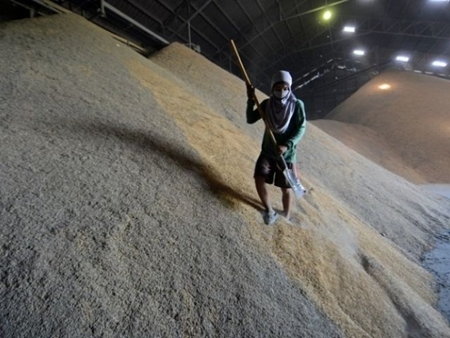BANGKOK, Nov 12 – Public dissent against the highly-criticised rice pledging scheme has escalated with noted public figures issuing fresh warnings, charging the government with running the country into serious debt.
Former deputy prime minister Pridiyadhorn Devakula said farmers will benefit from the scheme but long term stocks of rice will reduce its quality and incur financial losses.
With a combined 21.95 million tonnes of rice in government stockpiles, the loss will be as great as Bt140 billion, he said, adding that the public debt will be as high as 47.8 per cent of gross domestic product (GDP) and it will increase to 49.9 per cent of GDP by the end of this year.

If the government carries on the project into next year, public debt will skyrocket to 61 per cent of GDP, he warned.
Mr Pridiyadhorn expressed concern that other countries will have less confidence in Thailand and that the Thai currency will also be affected.
Academic ignorance, combined with corruption, is twice as dangerous to the country, he said, adding that it is most difficult to salvage the country’s loss of credibility in the face of the international community’s lack of confidence in Thailand.
Nipon Poapongsakorn, a senior academic at the Thailand Development and Research Institute (TDRI), said the government has breached its agreement with the World Trade Organisation (WTO) as it has set an intervention ceiling for the rice market at 3-4 million tonnes but Thailand has gone far beyond the promised figure and the government has not disclosed any information on the rice deal to the public.
Warning against the rice-for-train barter contract with China, he said brokers of both countries will benefit for both the rice and train deals.
The government, he said, has lost Bt172 billion since the start of the rice pledging scheme while benefits to farmers were only Bt110 billion, and rice mills and warehouse operators earned big profits of Bt21.38 billion and Bt2.313 billion respectively.
The longer rice is stocked, the lower its quality becomes, as it deteriorates, and losing quality will cost nearly Bt10.5 billion while the government also has to pay interest of Bt14.45 billion for loans with financial institutes, he said.
Dr Nipon called on the Commerce Ministry to leave it to the private sector and the market mechanism, and refrain from intervention in selling rice to Cambodia.
The Finance Ministry admits it has just Bt150 billion budget for next year’s rice pledging scheme and there is concern that the Bank of Agriculture and Agricultural Cooperatives (BAAC) must bear the financial burden since the cost of the scheme will exceed Bt300 billion.
Chookiat Opaswongse, honorary president of the Thai Rice Exporters Association, described the government’s planned purchase of 4 million tones of rice from Cambodia as ridiculous.
“Where will we stock the rice? Buying rice from Cambodia does not put Thailand on a competitive edge with Vietnam,” he said. With the government’s announcement to export 8.5 million tonnes of rice, and buying white rice at US$800/tonne, it will be impossible for Thailand to compete with Vietnam which sells rice at US$450-460/tonne.
In the global market, the US sells rice at US$600/tonne, Thailand at US$580/tonne, Vietnam at US$450/tonne, India and Pakistan at US$440/tonne while Myanmar has started to export at US$400/tonne, he said.
The government will only lose if it pledges rice at US$800/tonne, he said, adding that the government has more than 10 million tonnes of rice in stock, excluding rice from the new harvest which will add to the stock.




